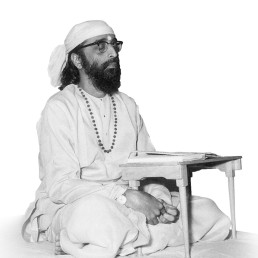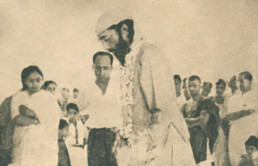
Jnana Yajna 79

Year & Dates:
January 15, 1961 to February 05, 1961

Yajna Topic:
Shrimad Bhagavad Gita- Chapter 2

Place:
Chittoor, India.
With the dawn of 1961, the swift spread of the Jnana Yajnas to more new cities also meant increased travel and greater commitments for Pujya Gurudev. But the tireless Master functioned from a realm that was not bogged down by time, place, numbers, or accolades.
For His 79th Jnana Yajna, Pujya Gurudev arrived in Chittoor, Andhra Pradesh. The audience, waiting to hear Him for the first time in their town, had gathered in the yajnashala inside the Chittoor school grounds.
The Reception: Just like in other locations, Pujya Gurudev was honored ceremoniously with the Purna Kumbha. “Purna Kumbha” meaning “a full pot,” this ritual signifies how the human body is made abundant by the divine fullness of the Life Principle. When a Purna Kumbha is presented to a sannyasi along with the chanting of the Vedic Arati, it is an act of reverence to recognize the state of fullness that has been gained through scriptural Knowledge.
Full Within and Filling All
The Welcoming Address: Sri C. Venkataramanayar, the president of the reception committee, extended a cordial welcome to Pujya Gurudev and spoke about the importance of knowing the symbolic depths of Hinduism. Quoting the Irish playwright, G.B. Shaw, he said: “The apparent multiplication of Gods is bewildering at first sight; but soon you discover that they are all the same God, in different aspects and functions. This makes Hinduism the most tolerant religion in the world, because its one transcendent God includes all possible gods.”
The Chief Guest’s words: Shri K.S. Ramaswami Sastriar, a scholarly octogenarian and retired District Judge who had served in Chittoor in 1922, reminisced how he had attended Pujya Gurudev’s Jnana Yajna in Chennai in 1953 and later had the opportunity to write the foreword to His commentary on Shrimad Bhagavad Gita. Shri Sastriar hailed Pujya Gurudev as the “prophet of the world’s new Age.” Modifying the final verse of the Gita, He said, “Where Krishna, the Yogeshwara, and Chinmaya with bow in hand (bent on action) are together present, there, success and Grace of God will surely come.”
From Pujya Gurudev’s Inaugural address: Calling Himself as only a seeker, Pujya Gurudev shared how He too had first questioned the worth of Hindu culture. He urged the youth of India to investigate Hinduism with firm rational analysis. Tracing how humankind had moved from the era of perception and observation into analysis, He stated that Science had paused to wonder at the threshold of religion: “Who is the law-giver of nature; why is it that natural laws are never disobeyed? Who am I? Whence and why did I come?”
The Discourses and the Audience: As Pujya Gurudev unfolded the comprehensive philosophy through the compelling verses of Gita’s chapter 2 and supplemented the knowledge through the morning classes on Atma Bodha, Chittoor was captivated. For the few non-English seekers who sat through the discourses in reverent silence watching every gesture, Pujya Gurudev quickly arranged for Telugu translations.
For Reflection: The questioning masses identified with His quest, and He understood their seeking with deep empathy, even though He had reached the Destination. That was the inspiration that drew thousands wherever He went.

“Think,” Says Pujya Gurudev
That the same objects can give two different types of experiences to two different individuals is very well known. The object remains the same, if it can give different experiences, it is evidently clear that it is because of the difference in the mental composition in the individuals. It is also observed that objects of one’s intense fancy during a certain stage in our life, by themselves become a nuisance to the same individual after a time; for, as time passes on, the mental constitution of the individual also gets changed. In short, it is very clear that the external objects can convey their stimuli to the level of our experience only when our minds through the sense-organs come in contact with the objects.
He who can understand that the objects-of-the-world, in the flux of change, should ‘come and go’ should come to exist and disappear to perish; he shall not allow himself to be tossed by the existence or non-existence of the finite things of the world. In the flood of time, things and incidents, circumstances and environments flow up to our present from the unknown future, to give us vivid experiences of carried intensity, and they, in their very nature, cannot remain permanently but must of necessity pass on to become one with the entire past. Nothing can remain the same, even for a short period, in the world-of-objects where change alone is the changeless law.
From Tyagi Magazine
Why are you not Happy?
We lack control over our minds, thereby incessantly chase fleeting desires, and devoid ourselves of inner peace and contentment. Without the ability to contemplate consistently, we remain trapped in mental agitation, unable to find true happiness. To attain mastery over the mind, one must control the senses, rise above attachments and aversions, and act in the world with equanimity.
